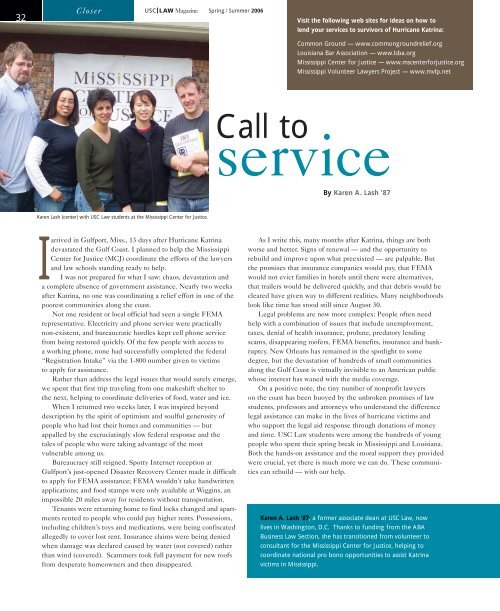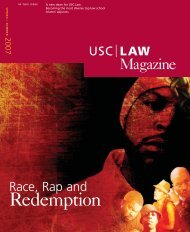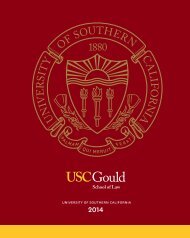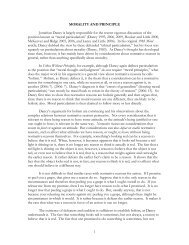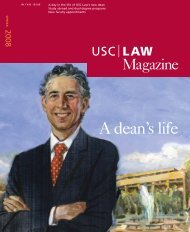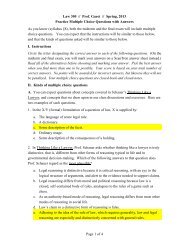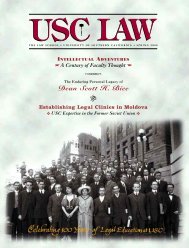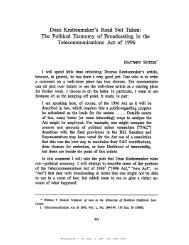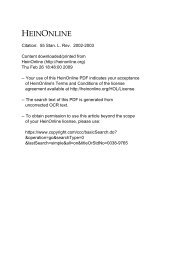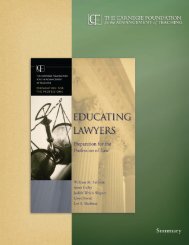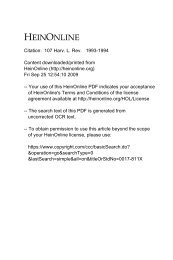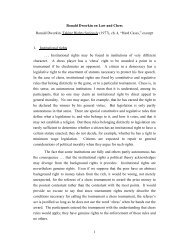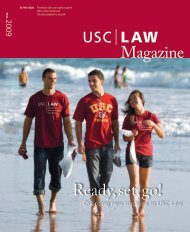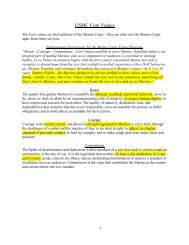download issue - USC Gould School of Law - University of Southern ...
download issue - USC Gould School of Law - University of Southern ...
download issue - USC Gould School of Law - University of Southern ...
Create successful ePaper yourself
Turn your PDF publications into a flip-book with our unique Google optimized e-Paper software.
32<br />
Closer<br />
Magazine<br />
Spring / Summer 2006<br />
Visit the following web sites for ideas on how to<br />
lend your services to survivors <strong>of</strong> Hurricane Katrina:<br />
Common Ground — www.commongroundrelief.org<br />
Louisiana Bar Association — www.lsba.org<br />
Mississippi Center for Justice — www.mscenterforjustice.org<br />
Mississippi Volunteer <strong>Law</strong>yers Project — www.mvlp.net<br />
Call to<br />
service<br />
By Karen A. Lash ’87<br />
Karen Lash (center) with <strong>USC</strong> <strong>Law</strong> students at the Mississippi Center for Justice.<br />
Iarrived in Gulfport, Miss., 13 days after Hurricane Katrina<br />
devastated the Gulf Coast. I planned to help the Mississippi<br />
Center for Justice (MCJ) coordinate the efforts <strong>of</strong> the lawyers<br />
and law schools standing ready to help.<br />
I was not prepared for what I saw: chaos, devastation and<br />
a complete absence <strong>of</strong> government assistance. Nearly two weeks<br />
after Katrina, no one was coordinating a relief effort in one <strong>of</strong> the<br />
poorest communities along the coast.<br />
Not one resident or local <strong>of</strong>ficial had seen a single FEMA<br />
representative. Electricity and phone service were practically<br />
non-existent, and bureaucratic hurdles kept cell phone service<br />
from being restored quickly. Of the few people with access to<br />
a working phone, none had successfully completed the federal<br />
“Registration Intake” via the 1-800 number given to victims<br />
to apply for assistance.<br />
Rather than address the legal <strong>issue</strong>s that would surely emerge,<br />
we spent that first trip traveling from one makeshift shelter to<br />
the next, helping to coordinate deliveries <strong>of</strong> food, water and ice.<br />
When I returned two weeks later, I was inspired beyond<br />
description by the spirit <strong>of</strong> optimism and soulful generosity <strong>of</strong><br />
people who had lost their homes and communities — but<br />
appalled by the excruciatingly slow federal response and the<br />
tales <strong>of</strong> people who were taking advantage <strong>of</strong> the most<br />
vulnerable among us.<br />
Bureaucracy still reigned. Spotty Internet reception at<br />
Gulfport’s just-opened Disaster Recovery Center made it difficult<br />
to apply for FEMA assistance; FEMA wouldn’t take handwritten<br />
applications; and food stamps were only available at Wiggins, an<br />
impossible 20 miles away for residents without transportation.<br />
Tenants were returning home to find locks changed and apartments<br />
rented to people who could pay higher rents. Possessions,<br />
including children’s toys and medications, were being confiscated<br />
allegedly to cover lost rent. Insurance claims were being denied<br />
when damage was declared caused by water (not covered) rather<br />
than wind (covered). Scammers took full payment for new ro<strong>of</strong>s<br />
from desperate homeowners and then disappeared.<br />
As I write this, many months after Katrina, things are both<br />
worse and better. Signs <strong>of</strong> renewal — and the opportunity to<br />
rebuild and improve upon what preexisted — are palpable. But<br />
the promises that insurance companies would pay, that FEMA<br />
would not evict families in hotels until there were alternatives,<br />
that trailers would be delivered quickly, and that debris would be<br />
cleared have given way to different realities. Many neighborhoods<br />
look like time has stood still since August 30.<br />
Legal problems are now more complex: People <strong>of</strong>ten need<br />
help with a combination <strong>of</strong> <strong>issue</strong>s that include unemployment,<br />
taxes, denial <strong>of</strong> health insurance, probate, predatory lending<br />
scams, disappearing ro<strong>of</strong>ers, FEMA benefits, insurance and bankruptcy.<br />
New Orleans has remained in the spotlight to some<br />
degree, but the devastation <strong>of</strong> hundreds <strong>of</strong> small communities<br />
along the Gulf Coast is virtually invisible to an American public<br />
whose interest has waned with the media coverage.<br />
On a positive note, the tiny number <strong>of</strong> nonpr<strong>of</strong>it lawyers<br />
on the coast has been buoyed by the unbroken promises <strong>of</strong> law<br />
students, pr<strong>of</strong>essors and attorneys who understand the difference<br />
legal assistance can make in the lives <strong>of</strong> hurricane victims and<br />
who support the legal aid response through donations <strong>of</strong> money<br />
and time. <strong>USC</strong> <strong>Law</strong> students were among the hundreds <strong>of</strong> young<br />
people who spent their spring break in Mississippi and Louisiana.<br />
Both the hands-on assistance and the moral support they provided<br />
were crucial, yet there is much more we can do. These communities<br />
can rebuild — with our help.<br />
Karen A. Lash ’87, a former associate dean at <strong>USC</strong> <strong>Law</strong>, now<br />
lives in Washington, D.C. Thanks to funding from the ABA<br />
Business <strong>Law</strong> Section, she has transitioned from volunteer to<br />
consultant for the Mississippi Center for Justice, helping to<br />
coordinate national pro bono opportunities to assist Katrina<br />
victims in Mississippi.


